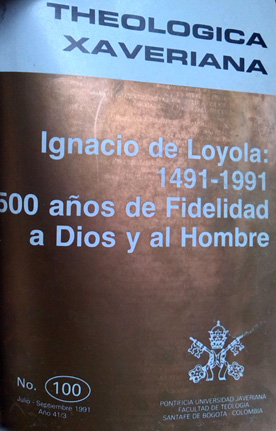Abstract
Esta fonna griega se emplea en el lenguaje común de la Iglesia, particularmebnte a partir del Concilio Vaticano 11. (L.G. n. 12 y en la Compañia de Jesús c.G. 32, D. 4nn. 13-17).
Una de las grandes originalidades de este Concilio fue el haber aslmudo para la Iglesia una denominación propia del Antiguo Testamento, a saber, Pueblo de Dios y haber concretado esa noción de Pueblo de Dios en otra denominación ya exclusiva de la Conllmidad Cristiana Primitiva, Cuerpo de Cristo, para significar que en la Iglesia, Pueblo de Dios, ya no se trata de una organización más bien política, sino de un orgrulismo vivo, el Cuerpo del Señor, en donde lo que funciona y se da gratuitamente es la vida uusma de Dios, y sus nuembros por su parte son vivos por comportarse divinamente en la edificación de la unidad del Cuerpo, supuesta una saturación o dominio de esa misma vida divina en ellos.
This journal is registered under a Creative Commons Attribution 4.0 International Public License. Thus, this work may be reproduced, distributed, and publicly shared in digital format, as long as the names of the authors and Pontificia Universidad Javeriana are acknowledged. Others are allowed to quote, adapt, transform, auto-archive, republish, and create based on this material, for any purpose (even commercial ones), provided the authorship is duly acknowledged, a link to the original work is provided, and it is specified if changes have been made. Pontificia Universidad Javeriana does not hold the rights of published works and the authors are solely responsible for the contents of their works; they keep the moral, intellectual, privacy, and publicity rights.
Approving the intervention of the work (review, copy-editing, translation, layout) and the following outreach, are granted through an use license and not through an assignment of rights. This means the journal and Pontificia Universidad Javeriana cannot be held responsible for any ethical malpractice by the authors. As a consequence of the protection granted by the use license, the journal is not required to publish recantations or modify information already published, unless the errata stems from the editorial management process. Publishing contents in this journal does not generate royalties for contributors.


